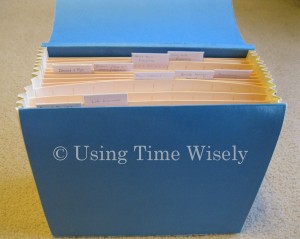 Excitement time! Today, we will complete our fourth category in our insurance document file. Yeah!
Excitement time! Today, we will complete our fourth category in our insurance document file. Yeah!
Remember: Your file will hold the insurance policies you carry. If you do not have one of these policies, then just skip it. This series is not meant to place pressure on you to buy more policies. I only share how I have organized our important documents.
Within this category, we have filed our Health Savings Account (HSA), Pre-Tax Group Insurance Premium, and Medical Spending Account documents. The last set of documents in this file opening is the Dependent Care Spending Account paperwork.
NOTE: I have never had this type of spending account. Though I have researched and understand the savings through this program, I can only offer information and not my experiences.
I have had the wonderful privilege of staying home with my children, and when needed, we have close family and friends to babysit for us. We are very fortunate and have not needed a dependent care spending account. However, the benefits are worth having one if you incur dependent care expenses which is why I am devoting a post for this type of account.
Dependent Care Spending Account
Defined
A Dependent Care Spending Account is an IRS tax-favored account you can use to pay for your eligible dependent care expenses to make sure your dependents (child or elder) get care while you and your spouse (if married) are working. Withdrawn from your salary before deducting taxes, these funds allow you to pay your eligible expenses tax-free.
Types of Dependents
Check your policy, but usually dependents are individuals residing in your household for at least eight hours a day including:
- Children 12 years or younger and
- Adults or children mentally or physically incapable of self-care
Eligible Expenses
Changes occur to the law and policies, so check your policy. But some of the eligible expenses may include:
- After school care
- Baby-sitting fees
- Day care services
- In-home care/au pair services
- Nursery and preschool
- Summer day camps (but not overnight camps)
Ineligible Expenses
Most Dependent Care Spending Accounts will not reimburse for the following expenses:
- Books and supplies
- Child support payments or child care if you are a non-custodial parent
- Health care costs
- Tuition costs
- Services provided by your dependent, your spouse’s dependent or your child who is under age 19
Cost
Possible Fees
Our policy would charge a $2.50 administration fee per month along with our $.12 per month for the pre-tax group insurance premium (since these fees get paid with pre-tax dollars). Each policy has its own fees and regulations. Just check with the employer for specific requirements.
Availability of Funds
Once you sign up for a Dependent Care Spending Account and decide how much you want to contribute, the funds available to you depend on the real funds in your account. Unlike a Medical Spending Account, the entire annual amount is not available during the plan year, but rather after your payroll deductions get deposited.
For example, if you incur $500 in dependent care expenses and your account from payroll deductions has a $400 balance, then you can only get $400 in reimbursement. Once the next payroll deduction amount reaches your account, you can request the remaining $100 reimbursement. This is only an example. Your provider may only allow one reimbursement per bill. If that is the case, then you would need to wait for the next payroll deduction to submit the $500 bill for reimbursement.
Losing your Allotment
Similar to the Medical Spending Account, any money remaining in your account cannot be returned to you or carried forward to the next plan year. Be conservative in your estimates and abide by the limits on the Dependent Care Spending Account.
Using Time Wisely
The other cost is your time. You will need to supply information about your caregiver to your provider and then prepare and send forms for reimbursement. Your time is valuable, but in using time wisely, you can save hundreds of dollars on dependent care through this savings channel.
Documents
If I had a Dependent Care Spending Account, I would keep the following documents in this file:
1. Notice of enrollment showing the payroll contribution amount
2. Forms or instructions for filing for reimbursement
3. Correspondence from your provider including explanation of spending account and privacy policies
With these documents gathered, I would paper clip them together and place them behind our medical spending account paperwork. If you do not have this account, like me, then your file will not have this information.
I do keep some documentation about this type of account in our file because I may need it one day. If I need to return to the workplace and our children or our parents need care during the day, then we can enroll in a Dependent Care Spending Account.
Congratulations on completing another category in our insurance file housed in Box 2. You are making progress. Keep up the great work while using time wisely. Happy organizing!
Question: Do you use a Dependent Care Spending Account? If so, what would you add to this list?